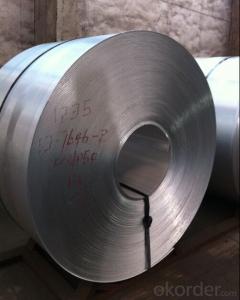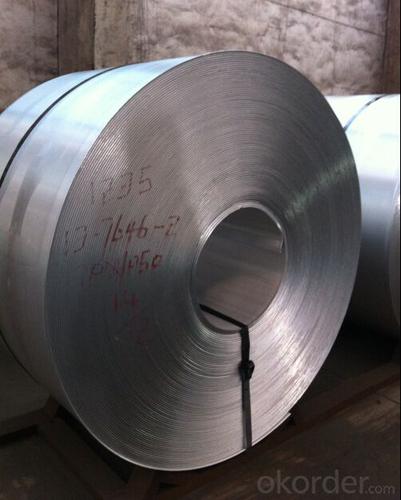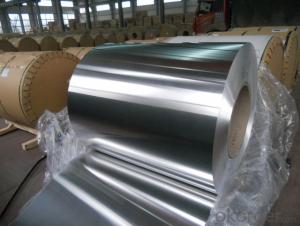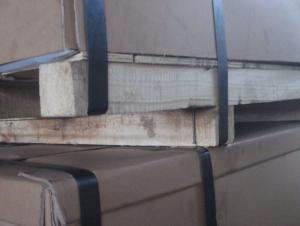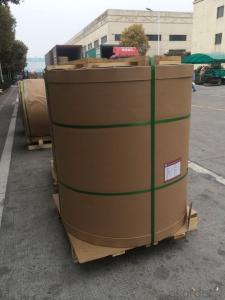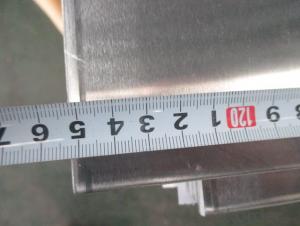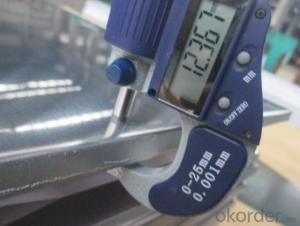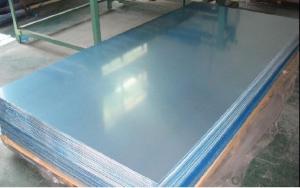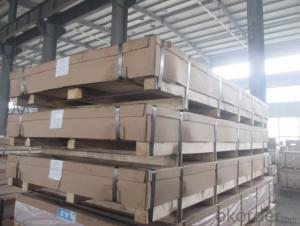Black Aluminum Sheets 4 X6.5 - Aluminium Mirror Finish Sheet with Best Price in Our Warehouse
- Loading Port:
- Shanghai
- Payment Terms:
- TT OR LC
- Min Order Qty:
- 1 m.t.
- Supply Capability:
- 5000 m.t./month
OKorder Service Pledge
OKorder Financial Service
You Might Also Like
Specification
1.Structure of Product Description
cold rolled aluminum sheet and hot roled mirror finish aluminum plate are both widely used int he field of construction field and decoration field, etc.
There are many different grades, such as: 1000 series,5000 series,7000series, 8000 series, etc. The Exactly Alloy number are as follows: 1000 series, etc.
1050,1060,1100, 2024, 3003, 3005, 3105, 5052,5754,5083,6061,6063,8011, etc.
The temper is include H14, H22, H24, H44, H114,etc.
2. Main features of the product
a. best price.
c. Shortest service.
3. Image.
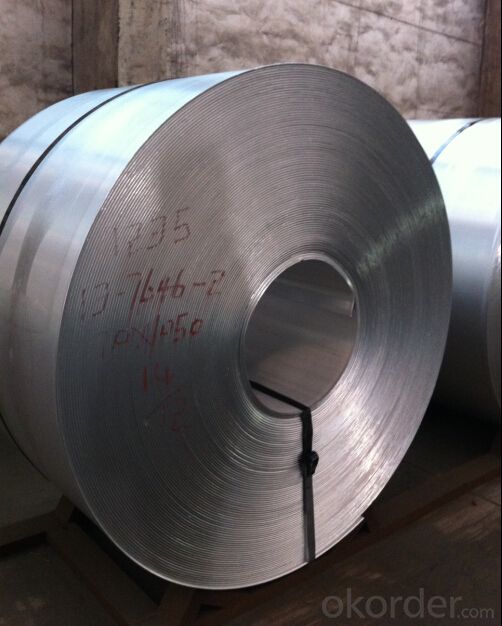
4. Product detailed sizes:
1000mm*2000mm,1250mm*2500mm,1500mm*3000mm, etc.
5. FAQ:
What is the quality standard?
---Usually our standard is GB3880-2006 or others.
What is the width range?
---It is from 500mm to 2500mm, etc.
What is the length range:
---It is from 800mm to 6000mm, etc.
What is the MOQ for your products yet?
---Normally it is around 11 tons/each size.
How many tons did you export in one year?
---Normally it is around 30000 tons totally.
Where is your client from?
---Normally it is from UAE, Saudi Arabia, England,Turkey,Japan, etc.
What is your mainly products?
---Normally they are aluminum sheet,big-5-bar aluminium checkered sheet,small-5-bar aluminium mirror finish aluminium sheet, aluminum casting coil, etc.
- Q: This question asks for an explanation of the various types of paint that can be applied to aluminum sheets.
- <p>Aluminum sheets can be coated with different types of paints to enhance their appearance, durability, and functionality. The common types include: 1) Acrylic Paints: Known for their flexibility and resistance to weathering and UV rays. 2) Polyester Paints: These offer excellent adhesion and gloss. 3) Epoxy Paints: Known for their chemical resistance and durability. 4) Polyurethane Paints: They provide a tough, scratch-resistant finish. 5) Powder Coatings: These are electrostatically applied and offer a durable, weather-resistant finish. 6) Fluoropolymer Coatings: They provide excellent resistance to chemicals and UV degradation. Each type has specific properties that make it suitable for different applications and environments.</p>
- Q: i need to know these things please....can aluminium withstand the forces of being in a cargo hold on a air freight, can it withstand extreme temps and to what extent an is it microwavable?? please help me
- No metals are microwavable, they will ruin any microwave oven by producing sparks. Even ceramic plates with a little metallic paint eg of silver will spark. Aluminium on its own has little strength but when mixed with small amounts of eg copper or manganese it aquires great strength while remaining light. In addition it has the advantage of being very resistant to oxidation and corrosion. It is certainly used extensively in aircraft construction. Due to being non toxic it used to make cans for beers, soft drinks (sodas) etc However it doesn't stand up well to high temperatures, its melting point is just at 660 degrees celsius, by comparison for iron it is 1540 and tungsten 3420.
- Q: Can aluminum sheets be coated with other materials?
- Yes, aluminum sheets can be coated with other materials. This process is known as aluminum sheet coating or aluminum sheet finishing. Coating aluminum sheets with other materials serves multiple purposes, such as enhancing their appearance, protecting against corrosion, improving durability, and providing insulation. There are various methods to coat aluminum sheets, including painting, anodizing, laminating, and powder coating. Each method offers different benefits and is chosen based on the desired outcome and intended use of the coated aluminum sheet. Coating aluminum sheets with other materials allows for customization, versatility, and increased functionality in a wide range of applications, including construction, automotive, aerospace, and consumer goods industries.
- Q: On the web page to see more information on the plating aluminum plate, I do not know what is the difference between aluminized and aluminum plating performance?
- Microstructure characteristics of hot dipped aluminized steelHot dip aluminizing steel to achieve the combination of atoms between iron and aluminum by metal bond, close together, as was shown under the microscope, from the outside to the inside with two aluminum film, three aluminum oxide layer, the alloy layer sequentially formed coating. If the coating of carbon steel, the banded structure and base metal contact.Coating thickness: if carbon steel, then the aluminum layer is 0.04-0.07mm alloy layer, the average 0.05mm. However, the thickness of each layer depends on the type of steel, the amount of carbon, and the temperature and time of the dipping. If the parent material is alloy steel, coating and the differences (omitted).
- Q: What is the maximum sheet size available for aluminum sheets?
- The maximum sheet size available for aluminum sheets varies depending on the specific supplier and manufacturer. However, commonly available sheet sizes for aluminum range from 4 feet by 8 feet (1219mm x 2438mm) to 5 feet by 10 feet (1524mm x 3048mm).
- Q: How do aluminum sheets perform in high-temperature environments?
- Due to its exceptional thermal conductivity and relatively low melting point, aluminum sheets are highly effective in high-temperature conditions. With a melting point of 660.3°C (1220.5°F), aluminum is able to endure elevated temperatures without melting, unlike many other metals. Furthermore, its remarkable thermal conductivity enables efficient heat dissipation from the surface, preventing overheating and maintaining the integrity of structures. This quality makes aluminum sheets ideal for applications in industries such as aerospace, automotive, and construction, which often encounter high temperatures. However, it is crucial to acknowledge that prolonged exposure to extremely high temperatures can lead to a weakening of aluminum and a reduction in its mechanical properties. Consequently, in extreme high-temperature environments, it may be necessary to explore alternative materials or implement additional protective measures to ensure optimal performance.
- Q: What is the typical torsional strength of aluminum sheets?
- The torsional strength of aluminum sheets can vary depending on factors such as alloy composition, thickness, and manufacturing process. However, aluminum sheets generally have good torsional strength compared to other materials. Commonly used aluminum alloys in sheet form, like 6061-T6 and 5052-H32, have torsional strengths ranging from approximately 22,000 to 40,000 psi. These values indicate the maximum torque the aluminum sheet can withstand before permanent deformation or fracturing. Torsional strength is just one aspect of aluminum sheet's overall mechanical properties. Tensile strength, yield strength, and elongation are other important factors in determining the suitability of aluminum sheets for specific applications. When choosing aluminum sheets for a torsional application, it is crucial to consider specific requirements and consult with material suppliers or engineers to ensure the selected aluminum sheet meets the desired torsional strength criteria.
- Q: Can aluminum sheets be painted after installation?
- Yes, aluminum sheets can be painted after installation.
- Q: (2) when aluminium foil is dipped in mercury for a short time and then placed in water a reaction is seen to occur with hydrogen gas being one of the products.?????
- Aluminium is very reactive in air and forms a protective oxide coating. This protects it when placed in water as aluminium oxide is unreactive with water. When immersed in mercury the oxide coating is removed and therefore the aluminium itself reacts when the cleaned aluminium metal is immersed in water.
- Q: This question asks for the common types of aluminum sheet windows and doors that are available in the market.
- <p>Common types of aluminum sheet windows and doors in the market include sliding windows, casement windows, fixed windows, and awning windows. For doors, there are sliding doors, swing doors, folding doors, and automatic doors. Each type has specific features and applications, such as sliding windows being space-saving and easy to operate, while casement windows offer better ventilation. Sliding doors are popular for their smooth operation and minimal space requirement, and swing doors are traditional and widely used for their durability and security. These aluminum products are valued for their strength, durability, and low maintenance requirements.</p>
Send your message to us
Black Aluminum Sheets 4 X6.5 - Aluminium Mirror Finish Sheet with Best Price in Our Warehouse
- Loading Port:
- Shanghai
- Payment Terms:
- TT OR LC
- Min Order Qty:
- 1 m.t.
- Supply Capability:
- 5000 m.t./month
OKorder Service Pledge
OKorder Financial Service
Similar products
Hot products
Hot Searches
Related keywords
